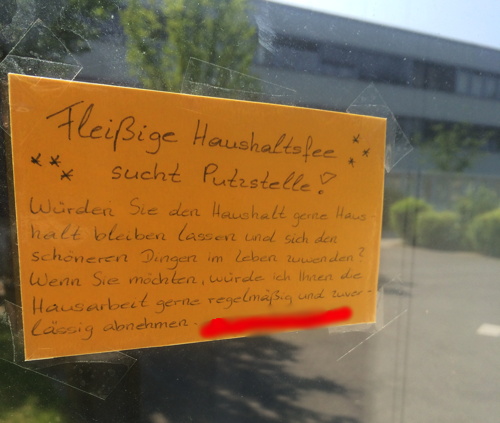“Evenin’, miss.”
“You? You did follow me!”
Granny got to her feet from the shadow of the Piper, where she had been sitting quite invisibly in the blackness.
“Learned that from my dad,” she said. “When he went hunting. He always used to say a bad hunter chases, a good hunter waits.”
“Lords and Ladies” by Terry Pratchett
I had to visit the hospital a few days ago, specifically the station for recovery after heart surgery and strokes. It wasn’t a particularly good day, but one of the nice things I’ve seen that day was a sign taped to the ticket machine at the parking lot:

While it has a slight taste of an ambulance chaser, it’s actually a pretty neat idea. After all, many people will need support at home when the partner is ill for quite some time, others simply won’t have the time to clean at home when the love of their life is in the hospital.
Personally, one of the best examples of “know where your target audience is” I have seen this year.
Even better, perhaps the hospital should offer vetted lists of people who can help out during hospitalization, include home care, pet care, and looking after children or elderly parents.
I know from experience that having a child with cancer can impose enormous burdens on parents. When one parent needs to be with the sick child full-time and the other needs to work to pay the bills, there’s often not enough time for the other children or housekeeping. Working night-shift on a Hem-Onc unit, I sometimes found myself substituting for a parent who couldn’t be there, rocking a child to sleep for instance. But I had seven very sick children to care for. The time I had to spare was very limited.
Some on that list might be paid positions, but others might be for volunteers for those who cannot afford to pay. A very sick child can impose almost impossible burdens on parents.
–Michael W. Perry, My Nights with Leukemia: Caring for Children with Cancer
http://inklingbooks.prosite.com/221883/2467804/gallery/my-nights-with-leukemia
Hoi Michael,
good points. The only helpful information for relatives of patients I found in the hospital was a flyer for a support group (relatives of stroke patients/stroke victims). But it was buried in a folder. I wasn’t visiting long, but I got the impression much of the care is aimed at physical health only. Other issues surrounding health seems to be neglected (emotional support, organizational support).